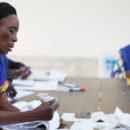The Case for Drought Preparedness

“The case for drought preparedness“ examines the vulnerability of Darfur’s towns, IDP camps and cities to years of low rainfall or drought in the context of the conflict and displacement. The rapid growth in Darfur’s towns and cities in the last five years places unprecedented concentrations of demands on Darfur’s low and variable water resources. Where these concentrations of population occur on areas with unfavourable hydrogeology there are risks of water shortages in the event of a year of poor rains. So far the rains during the crisis have been above average but this pattern cannot be relied on to continue. On the basis of hydrogeological analysis and consultation with water stakeholders in Darfur the report sets out a strategy for mitigating the impacts of drought in Darfur. It sets out how the principles of Integrated Water Resource Management could be applied in Darfur to promote improved dialogue and management of water resources as a means of mitigating potential conflict in the event of a dry year.
The UNICEF led collaboration between the international community, the Sudanese government organisations and nongovernmental organisations has made considerable achievements in delivering an emergency water and sanitation programme to conflict-affected communities in difficult operating conditions.
Both reports relied heavily on Darfurian experts and form part of a broad programme of analysis intended to support humanitarian programming appropriate to the complex social and environmental context in Darfur.
For further information and other UNEP reports on Sudan – see the UNEP Sudan web page.







Baffling how African nations seem to willingly ignore their most pressing isssues. Drought preparedness should beas pressing as an issue should get, but year after year it seem to be an eluding goal for all to reach.
Hard to believe